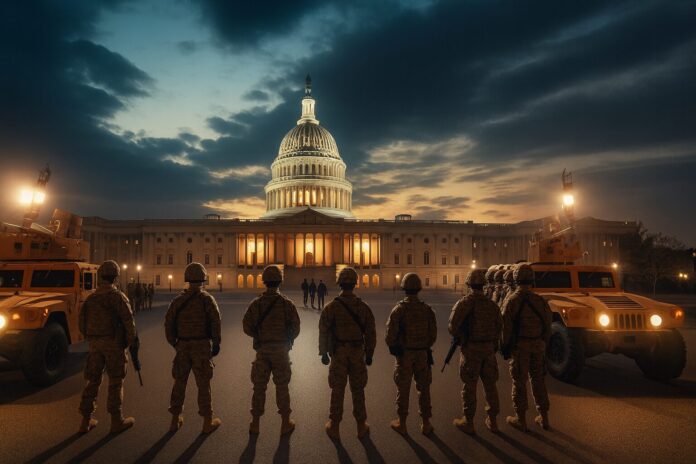In a recent essay we argued that Washington, D.C. requires a stronger federal presence to restore order — and that other cities with similar afflictions do as well (Washington D.C. Needed Federal Law Enforcement — and Other Cities Do Too, August 23, 2025). That position remains intact. What follows is not a reconsideration but a clarification: the federal government’s role in combating crime must be both robust and restrained, vigorous but bounded by the principles of constitutional governance. And while the National Guard can and should provide relief when circumstances demand it, its deployment must remain a rare, temporary, stopgap measure.
Federal law enforcement is hardly an exotic addition to urban life. Immigration authorities, the FBI, U.S. Postal Inspection Service, the Drug Enforcement Administration, the Bureau of Alcohol, Tobacco, Firearms and Explosives, and the U.S. Attorney’s Offices all operate in America’s cities (not to mention the SEC, and any number of regulatory agencies). These entities coexist with local police because lawlessness, by its nature, ignores tidy jurisdictional lines. The great bulk of urban crime is rooted in narcotics trafficking — inherently an interstate enterprise — or in the circulation of illegal firearms, which likewise flow across state borders. Federal involvement in such matters is not an imposition; it is a necessity, and well within the purview of federal authority.
Still, the National Guard must remain an instrument of last resort, deployed sparingly and only for temporary stabilization. It is, at best, a tourniquet — useful to stop bleeding, but no substitute for sustained healing. Lasting safety requires permanent investments in policing, akin to the model adopted in the 1990s when the Clinton administration secured passage of a crime bill that funded tens of thousands of additional officers nationwide.
Deploying the National Guard is problematic for two reasons. First, America should not have a permanent, internal military presence. Congress should therefore consider statutory limits on the use of the National Guard in domestic policing — perhaps prohibiting deployments longer than 90 days without legislative approval, with narrow exceptions for defending our borders, which is the Guard’s original purpose. At best, the sight of armored vehicles on urban streets, even when well-intentioned, is unsettling in a republic that insists upon civilian control of the military. That principle is not ornamental. It is essential to liberty. It reminds us that the military defends the nation but does not govern it. And at worst, the opportunity for abuse that comes with a standing military presence is far too real to be anything but discomfiting. One need not indulge in extravagant fears to acknowledge that the memory of President Trump’s disorderly departure from office in 2021 makes prudence all the more imperative.
Secondly, executive power is no substitute for legislation. It is one thing to use the authority of the presidency to stabilize an emergency; it is another, and more necessary, thing to legislate lasting remedies. President Trump, possessing majorities in both houses of Congress, has no excuse for failing to govern as presidents must — through laws. The Clinton administration demonstrated that Congress can be persuaded to enact a sweeping crime bill. The present administration can and should do likewise.
Such a “Trump Anti-Crime Act” could accomplish what executive orders cannot. It could establish enhanced penalties for violent and repeat offenders. It could authorize construction of new prisons, preventing the premature release of dangerous individuals. It could fund mental health facilities, reducing the menace posed by untreated illness that now stalks public transportation and public squares. It could expand resources for addressing homelessness, whose intersections with crime, drugs, and illness erode civic life. It could, and should, expand the capacities of federal institutions already tasked with law enforcement: the FBI, the U.S. Attorney’s Offices, and the federal courts. For a nation of 350 million people, there are only about 870 authorized Article III judgeships — far too few to handle their swollen dockets. To expand the judiciary would not be a luxury but a necessity. And it could condition future state aid on states with high-crime areas allocating more of their resources to policing, much the way NATO members are required to allocate a certain percentage of their budgets to defense.
Not only would the presence of additional police and other law enforcement officers deter crime, they could also assist in arresting criminals with outstanding warrants. This would be no small improvement. In New York City alone, as of January 6, 2025, there were 1,290,146 outstanding criminal warrants, according to the Mayor’s Office of Criminal Justice, because policing is focused on stopping new crimes. But simply executing those warrants would, without any new arrests for new offenses, reduce crime by removing from the streets individuals already subject to judicial process.
In short, the ease of deploying the National Guard must not obscure the difficulty of the more necessary work. The Guard can stabilize, but it cannot build. Only legislation can achieve lasting reform, create accountability, and align federal resources with measurable benchmarks for states and cities. The Clinton administration demonstrated imagination and resolve. The present administration has, if anything, fewer obstacles. The template exists. The need is urgent. What remains is the will to act.
You may also be interested in:












